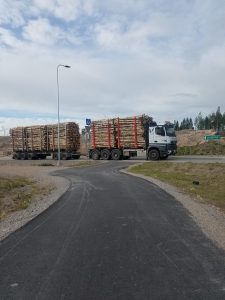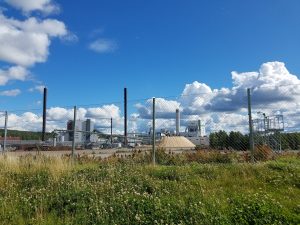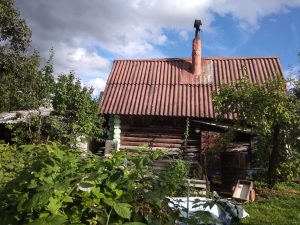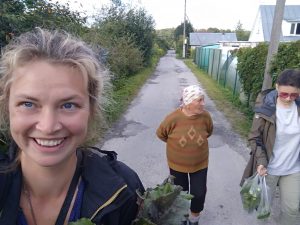Jana Holz presents preliminary results of her PhD studies at the „Doctoral Students’ Annual Conference: (De)Naturalising Extractivism: Investigating its Social Orders and Resistances” that took place online from 20th to 21st October. The conference is part of the EXALT Symposiums. In her presentation with the title „The (Non-)Conflict around Forest Bioeconomy in Finland. Locally Rooted ‘Green Extractivism’ under Revision” she discusses forest bioeconomy as an extractivist practice highlighting the conflicts and contradictions as well as possible (negative) future development.
Out and about: Lilian Pungas and Jana Holz doing field research
Two of our employees and prospective doctoral students did their field research in Finland and Estonia in the late summer weeks. There are two short reports here.
Field stay and interviews in Äänekoski, Central Finland

Jana Holz also traveled to Finland again in late summer 2020 for her dissertation project. For two weeks she was in Äänekoski, an industrial town in central Finland not far from the university town of Jyväskylä. As part of “flumen”, she examines innovations and changes in Finnish forestry with reference to the bioeconomy and their socio-structural significance for socio-ecological transformation processes. In the second field phase, she concentrated on the town of Äänekoski and the local organic product factory of the Finnish company Metsä Group. The plant is the most modern and efficient pulp mill in the northern hemisphere and has represented a milestone in the history of Finnish forestry since the planned investment was announced in 2015. There will also be created a system of innovative smaller plants that will do research and develop various biotechnologies related to pulp. On a local level, recent developments mean investments in infrastructure, a prosperous economy outside of the Metsä company premises and confidence for the future – but also increasing pressure on regional forests, threats to their biodiversity and increased traffic from deliveries to the factory. A double-edged sword well worth exploring sociologically with a view to different social groups in the city.

During the two weeks in Äänekoski, she was able to speak to numerous local actors from politics, business and civil society as well as local residents. The aim of the stay was to get a more precise idea of how local bioeconomization, modernization and intensification of forestry are changing the socio-ecological relationships and structures as well as various usage practices and understandings of nature and forest.

Flumen researcher Lilian Pungas was in August in Eastern Estonia and despite the Covid 19, managed to conduct numerous interviews in and around Narva and Sillamäe. In addition to her main research focus (the local subsistence farming practice), this time she also inquired about aspects such as
- the impact of Covid-19 on the local population
- gender aspects
- Human-Nature Relations
- the local oil shale sector and
- the current “Just-Transition” negotiation processes
Lilian Pungas examines the subsistence agriculture of the predominantly Russian residents of Narva in their dachas. In the 90s, after the collapse of the Soviet Union, they suffered particularly from the consequences of the transformation. High unemployment and a lack of prospects led to existential fears, which the residents met by growing their own food. With regard to mentalities, the group examined shows a high degree of skepticism towards neoliberal growth imperatives. As gardeners, the residents of Narva and Sillamäe already practice aspects of the bioeconomy.

Flumen contributions at the Degrowth Conference 2020
This years Degrowth Conference in Vienna will take place online because of the COVID-19 restrictions. From 29th of May to the 1st of June 2020 there will be workshops and lectures on current debates that relate to degrowth issues. The junior research group flumen will participate with five contributions to the conference:
- Matthias Schmelzer, together with Nina Treu, Tadzio Müller, Julianna Fehlinger and Brototi Roy, will present the newly published book “Degrowth in Movement(s)” on Friday, May 29th at 11:45 a.m. The book launch takes place in English with German translation.
- Dennis Eversberg and Melissa Büttner will also give the workshop “Sozial-ökologische Transformation: Mit wem – und gegen wen?” on Friday at 6 p.m. The workshop takes place in German.
- Dennis Eversberg will then take part in the panel discussion on “Understanding transformations and the role of strategy” at 6.45 p.m. The discussion will take place in English with German translation.
- On Saturday, May 30th, Matthias Schmelzer will take part in the panel discussion on “Advancing a Degrowth Agenda in the Corona Crisis” at 10 a.m. The discussion will take place in English with German translation.
- On Sunday, May 31st, at 5 p.m. Lilian Pungas together with Susan Andreatta, Christina Plank, Robert Hafner, Mladen Domazet and Branko Ancic will give the workshop: “Restructuring the Third / Corporate Food Regime: How Farmers and the Public are Transforming Food and Agriculture for the Future – Post-Covid-19 “. The workshop takes place in English.
Further information on the conference and a detailed program can be found here: https://www.degrowthvienna2020.org/en/program/.
Call for contributions: The bioeconomy as a blueprint for the postfossil society? Contours of the social after coal and oil
A set of sessions at the 7th International Degrowth and 16 th ISEE Joint Conference: Building Alternative Livelihoods in times of ecological and political crisis.
Manchester 1 to 5 September 2020.
We invite you to send us your abstracts of no more than 250 words until March 6, 2020 to:
flumen@uni-jena.de
More Information here.
The event is a collaboration between Junior Research Group Mentalities in Flux, Friedrich-Schiller-University Jena, Germany and Junior Research Group BioInequalities, Friedrich-Schiller-University Jena, Germany
Lilian Pungas field work in Eastern Estonia
For her dissertation within the junior research group flumen, Lilian Pungas traveled to the region around Narva in North-Eastern Estonia in August 2019. Partly with the help of her translator she conducted interviews with different experts in the bioeconomy sector and/or practitioners of (semi-)subsistence agriculture in Estonian as well as in Russian language.
Jana Holz in Finland
Jana Holz was from the 12th until the 23rd of August 2019 a visiting scholar at the University of Helsinki, doing research for her dissertation project. In total, she spendt four weeks in the North European country and visited the capital Helsinki, Tampere, Joensuu and Jyväskvlä. Jana Holz is writing her dissertation on innovations and changes in the Finnish forestry sector with reference to the bioeconomy and its socio-structural significance for transformation processes within the framework of the junior research group flumen.
UFZ Symposium in Leipzig
Lilian Pungas, Philip Koch and Jana Holz attended the symposium “Resources in Social Science Environmental Research” at the Helmholtz Center for Environmental Research from the 30th September until the 1st October, 2019 for “flumen”. Approximately 20 junior academics presented and discussed both, material and immaterial, resources and questions such as: how do resources shape the relationship between society and the environment, various dimensions of social inequality regarding the (in)availability and the use of resources, and what constitutes and defines a resource, in general.
Lilian Pungas gave a lecture at the University of Vienna
flumen researcher Lilian Pungas gave a lecture on 7 November 2019 at the University of Vienna, at the Institute for Political Science as part of their lecture series “Ecological Crisis in Eastern Europe”. Lilian’s lecture was titled “Subsistence farming under high voltage power lines and next to oil shale power plants in Eastern Estonia”.
Globally seen Estonia extracts of the oil shale, this resulting in very high ecological footprint per capita. For the sake of energy security from its Eastern neighbor (oil shale covers 90% of Estonia’s electricity demand) it accepts as a country an ecologically extremely high price for the extraction of one of the most polluting fossil fuels. Paradoxically, the oil shale extraction itself takes place in Eastern Estonia near Russian border in the region of Ida-Virumaa, where most habitants belong to the Russian-speaking minority, which suffered disproportionally in the 90s due to different economic reforms and the 1992 citizenship law.

